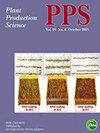直立穗型水稻旗叶长度对抽穗后冠层结构和生物量的影响
IF 1.3
3区 农林科学
Q2 AGRONOMY
引用次数: 5
摘要
提高水稻(Oryza sativa)的产量潜力是从事水稻改良计划的育种者和栽培者的主要目标。直立穗(EP)水稻通常高产,穗在成熟前保持不弯曲。本研究的目的是评价EP稻农艺性状与水稻产量的关系。本研究利用了辽粳5号(直立穗型粳稻)和万伦422(高产籼稻)的重组自交系(RILs)。籽粒产量存在差异,EP籽粒旗叶长度与籽粒产量呈负相关;然而,在非ep ril中,相关性不显著。在成熟后期,EP ril的旗叶长度也与生物量增加呈负相关。这可能反映了短旗叶的EP ril的冠层结构,其低层叶面积指数较大。此外,旗叶长短不同的EP ril下叶叶绿素含量差异显著,导致旗叶短的EP ril下叶光合能力更高。在本研究中,旗叶最短的EP系在两个年份的产量均高于万轮422。短旗叶的EP ril在成熟后期可能表现出更高的冠层光合速率;因此,该性状可能是EP水稻实现高产的潜在表型标记。图形抽象本文章由计算机程序翻译,如有差异,请以英文原文为准。
Effect of flag leaf length of erect panicle rice on the canopy structure and biomass production after heading
ABSTRACT Increasing the yield potential of rice (Oryza sativa) is the main objective of breeders and cultivators engaged in rice improvement programs. Erect panicle (EP) rice is generally high-yielding with panicles that remain non-curved until maturation. The aim of our study was to evaluate the association of agronomic traits with rice productivity in EP rice. Here, we used the recombinant inbred lines (RILs), crosses between Liaojing5 (erect panicle japonica type) and Wanlun422 (high-yielding indica type). The yield varied among the RILs, and the flag leaf length of EP RILs was negatively correlated with the yield; however, the correlation was not significant in the non-EP RILs. The flag leaf length of the EP RILs was also negatively correlated with biomass increase during the late ripening stage. This may reflect the canopy structure of the EP RILs with short flag leaves which had a larger leaf area index in the lower strata. Additionally, the chlorophyll content in the lower leaf significantly differed among the EP RILs with flag leaves of different lengths, resulting in a higher photosynthetic ability of the lower leaf of EP RILs with short flag leaves. In the present study, an EP line, which has the shortest flag leaf, showed a higher yield than Wanlun422 in both years. EP RILs with short flag leaves might show a higher canopy photosynthetic rate in the later ripening stage; therefore, this trait could be a potential phenotypic marker for achieving high yield of EP rice. Graphical Abstract
求助全文
通过发布文献求助,成功后即可免费获取论文全文。
去求助
来源期刊

Plant Production Science
农林科学-农艺学
CiteScore
5.10
自引率
4.00%
发文量
27
审稿时长
>36 weeks
期刊介绍:
Plant Production Science publishes original research reports on field crops and resource plants, their production and related subjects, covering a wide range of sciences; physiology, biotechnology, morphology, ecology, cropping system, production technology and post harvest management. Studies on plant production with special attention to resource management and the environment are also welcome. Field surveys on cropping or farming system are also accepted. Articles with a background in other research areas such as soil science, meteorology, biometry, product process and plant protection will be accepted as long as they are significantly related to plant production.
 求助内容:
求助内容: 应助结果提醒方式:
应助结果提醒方式:


